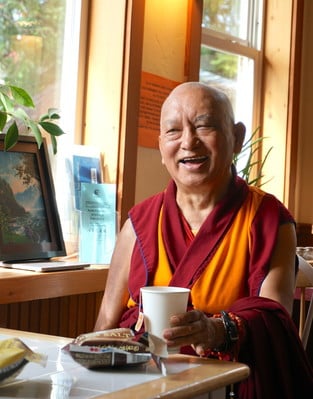My most dear, most precious, most kind, wish-fulfilling one, and also your assistants and people who are helping you and helping the center,
How are you? I want to say thank you from my heart a billion, zillion, trillion times, to you and to all the helpers at the center, all the assistants, the SPC and so forth.
I heard that you and the assistants and those working at the center are helping support the Sangha in doing pujas and practices in the morning and evening. That is really needed; it is very, very good to be united. Then the nuns will have more inspiration to do the practices, which also become like pujas for the center because the dedication is done for that.
You were talking about how to have more harmony when I was there but I didn’t get to mention this to you. One suggestion for harmony is in the way of speaking, communicating with others. Basically, for common people this means communicating compassionately and being respectful to others. I know you are doing this very sincerely from your heart; each time you speak it is really coming from the heart. That’s very nice, very nice.
I have written one advice mainly for the director of a center where many people got upset because the director talked in a very scolding and rough way. So I gave this advice on how to speak to others [How to Make Your Life Most Beneficial for Other Beings, Even With Your Speech.] This is because other people’s happiness depends on us; it depends on how we act and how we speak. Our way of speaking can be either disrespectful or respectful. One way of speaking brings problems to others and to ourselves; the other way of speaking is in a nice, respectful way that brings happiness to others and to ourselves.
The advice is not only for you but for all the people helping at the center. It is for anybody—even those not working at the center still need it; even if they are living alone. Everyone needs this advice if they want happiness and don’t want suffering.
When other people are suffering and disturbed and we see them complaining, then we become unhappy. However, when we are able to do something with the motivation of compassion and help others in a nice, respectful way then it brings them happiness. And when we see others happy, it brings us happiness.
This is mainly talking about avoiding suffering and experiencing happiness for oneself, but actually others, who are numberless, are most important. I’m sure you know how others’ happiness totally depends on you. It depends on how you think and how you act every day, and that’s why it’s important to have respectful manners.
Another way to bring harmony is by having a picture of the four harmonious brothers around the center, in the office and a few different places. You can make this picture of the four harmonious brothers bigger or even have one painted. This helps to bring harmony.
The eight auspicious signs are also a very good way to stop inauspicious, bad things happening and to bring auspiciousness and success. It is very good to hang these in the office and in other places.
I heard you are not a Buddhist, which is interesting, but I want to know what you think the definition of being a Buddhist is.
Some people think being a Buddhist means doing prayers, reciting mantras and so forth. Some people think that because you don’t do that, then you are not a Buddhist. But that alone doesn’t define being Buddhist. There are many non-Buddhists doing mantras, prayers and chanting because they are interested in chanting, and there are some people who can even explain sutra and tantra without being Buddhist, for example, a professor who is not Buddhist. Not being Buddhist means not having refuge in one’s mind in the Buddha, Dharma and Sangha.
There are Buddhists who don’t do prayers and are not much involved in those things, but who have very strong reliance on Buddha, Dharma and Sangha by understanding that they have the power and qualities [to lead us to happiness, liberation and enlightenment.]
The Buddha, by showing us the path, is like the doctor giving us medicine.
Dharma is like the actual medicine healing the disease. Dharma heals the cause of suffering—delusion and karma—and also heals the suffering of death, old age, sickness, birth and all our dissatisfaction. This includes the second kind of suffering—the suffering of change, which is how we label all the samsaric pleasures. These pleasures are not like Dharma happiness, which we can continue, develop and then complete when we achieve liberation from samsara and especially when we achieve buddhahood, the total cessation of all the obscurations and completion of all the realizations.
Dharma ceases the cause of suffering, delusion and karma, which comes from the negative imprints. Due to our own realizations, our own mind, we can be totally liberated from the suffering of pain, the suffering of change and pervasive compounded suffering—the fundamental suffering from which the other two sufferings arise.
The aggregates are under the control of karma and delusion and because of that, they are pervaded by suffering. The contaminated seeds of delusion and karma arise and from these seeds the delusions arise again and the suffering of this life and future lives arises again. However, this can be ceased. We can become totally free forever from this—from the third suffering—and we can achieve the blissful state of peace for ourselves. Of course there is also great liberation, buddhahood, which itself is Dharma.
Then there are the Sangha, who help us to actualize the Dharma.
With much love and prayers. If there is something, please, you can always contact me































